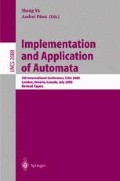Abstract
Cover automata were introduced in [1] as an efficient representation of finite languages. In [1], an algorithm was given to transform a DFA that accepts a finite language to a minimal deterministic finite cover automaton (DFCA) with the time complexity O(n4), where n is the number of states of the given DFA. In this paper, we introduce a new efficient transformation algorithm with the time complexity O(n2), which is a significant improvement from the previous algorithm.
This work has been partially supported by the Natural Sciences and Engineering Research Council of Canada grants OGP0041630 and a graduate scholarship.
Access this chapter
Tax calculation will be finalised at checkout
Purchases are for personal use only
Preview
Unable to display preview. Download preview PDF.
References
C. Campeanu, N. Santean, S. Yu, “Minimal Cover-Automata for Finite Languages”, Proceedings of the Third International Workshop on Implementing Automata (WIA’98) 1998, 32–42.
J.-M. Champarnaud and D. Maurel, Automata Implementation, Third International Workshop on Implementing Automata, LNCS 1660, Springer, 1999.
C. Dwork and L. Stockmeyer, “A Time Complexity Gap for Two-Way Probabilistic Finite-State Automata”, SIAM Journal on Computing, vol.19 (1990) 1011–1023.
J. Kaneps, R. Frievalds, “Running Time to Recognize Non-Regular Languages by 2-Way Probabilistic Automata”, in ICALP’91, LNCS, Springer-Verlag, New-York/Berlin (1991) vol 510, 174–185.
N. Santean, Towards a Minimal Representation for Finite Languages: Theory and Practice, MSc Thesis, Department of Computer Science, The University of Western Ontario, 2000.
D. Wood and S. Yu, Automata Implementation, Second International Workshop on Implementing Automata, LNCS 1436, Springer, 1998.
Author information
Authors and Affiliations
Editor information
Editors and Affiliations
Rights and permissions
Copyright information
© 2001 Springer-Verlag Berlin Heidelberg
About this paper
Cite this paper
Păun, A., Sântean, N., Yu, S. (2001). An O(n2) Algorithm for Constructing Minimal Cover Automata for Finite Languages. In: Yu, S., Păun, A. (eds) Implementation and Application of Automata. CIAA 2000. Lecture Notes in Computer Science, vol 2088. Springer, Berlin, Heidelberg. https://doi.org/10.1007/3-540-44674-5_20
Download citation
DOI: https://doi.org/10.1007/3-540-44674-5_20
Published:
Publisher Name: Springer, Berlin, Heidelberg
Print ISBN: 978-3-540-42491-8
Online ISBN: 978-3-540-44674-3
eBook Packages: Springer Book Archive

